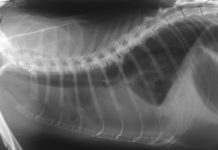Heartworm condition in cats is variously curable. It is very important to know all the facts necessary for the treatment of it. Even though heartworm condition in cats was actually limited largely one to wet and warm areas, now, it has its spread all over the world. In this article, we are going to discuss mainly about what this condition is, the symptoms of heartworm in cats, and its causes. We have a separate article for the prevention of it, as well as its treatment. Give this article a read and learn more!
Heartworm Disease: What is this?

The heartworm disease, actually is a hypothetically lethal disease in domesticated animals in USA and some other parts of the world. It is due to heartworms or a 12”-long worms, which animate in the lungs, heart, and related blood vessels of the pet that’s affected. This is what causes austere lung condition, heart disease, and mutilation to some other body organs.
Furthermore, the heartworm disease distresses ferrets, dogs, as well as cats, yet heartworms may also exist in some other species of mammals, just like sea lions, foxes, coyotes, wolves, and in unusual circumstances –humans. Due to the fact that wild species like coyotes and foxes living in the proximity to a lot of urban regions, they are actually considered the main transporters of the condition.
Cats and Dogs
As what I have said earlier, the condition affects cats and dogs, we will mainly be discussing its effect on cats, but we would also like to discuss a bit of the condition affecting the dogs. Keep on reading to learn more!
- Cats. The heartworm disease in cats is so different from the heartworm that the dogs may experience. The cats, as we all know, is an atypical host for the heartworms. Further, most of the worms in the cats don’t really survive to their adult phase. Cats who have adult heartworms usually have only 1-3 worms, and a lot of cats affected by the heartworms have zero adult worms.
- Even though this means that the heartworm ailment often becomes undiagnosed in cats, it’s so significant to apprehend that even the young worms may cause some damages in the look of the condition that is known as the HARD or heartworm connected respiratory disease. Furthermore, the medication that is used in treating the infection in dogs should not be used for cats. Therefore, the inhibition is the only way that you can use to protect the cats from the different effects of the heartworm disease.
- Dogs. The dog is actually a natural host for the heartworms. This just means that the heartworms that exist in the dog may mature and become adults. They also mate and produce offspring. When you leave it without any treatments, their numbers may rapidly increase, and the dogs have been known to harbor numerous worms in the body.
- Moreover, the heartworm disease may cause lasting damage to the heart, arteries and lungs, and may affects the health of the dog. As well as its quality of life extensively after the disease-causing parasites are already gone. For this particular reason, the prevention is the best option to opt to. Further, the treatment, if needed, must be administered as early as possible.
Causes of Heartworm in Cats
Before we get to the symptoms of heartworm in cats, let us first discuss what really causes this condition to our pets. The heartworms in cats are actually spread via mosquito bites that carries infective heartworm larvae. Due to the fact that the lifecycle of heartworms that affect the cats is much shorter than the cycle of those that infect dogs, a look at the process of infestation in dogs is beneficial. Furthermore, in dogs, the larvae actually migrate from the bite wound via the body ‘til they finally reach the lungs’ blood vessels and the heart.
Moreover, here, the larvae gets mature and reproduce, thus releasing immature heartworms. This is what they call the microfilaria –they go into the blood of the animal. It is vital to note that the presence of the microfilaria in the blood itself is actually not common in cats. This has actually been seen in less than 20% of cats infected.
Furthermore, it is also important to bear in mind that because the heartworms in cats have much shorter lifespan than the ones that infest dogs, an impulsive cure without the treatment is more probable to happen.
Symptoms of Heartworm in Cats

The symptoms of heartworm in cats actually include:
- Weight loss
- Loss of appetite
- Lack of energy
- Coughing
All of these are the same with the dogs. However, the cats, as well, may experience diarrhea, fainting, shock, as well as sudden death at the austere end of the infection itself. Moreover, the diagnosis of heartworm also depends on a test of the existence of female worm antigens. These particular antigens may only be specified after negligibly seven months of the infection. Therefore, a cat may easily die even before the test indicate that it is positive for heartworms. There is also an available antibody test, yet cats may test positive for up to quite a few months after expelling the worms. Echocardiography and X-ray tests are used by veterinarians to detect the adult heartworms.
Heartworm prevention in cats is very problematic. Therefore, the treatments for heartworm imperfectly comprises of the use of a regular heartworm drug and a short-term corticosteroid –a steroid that comes in the adrenal cortex.









